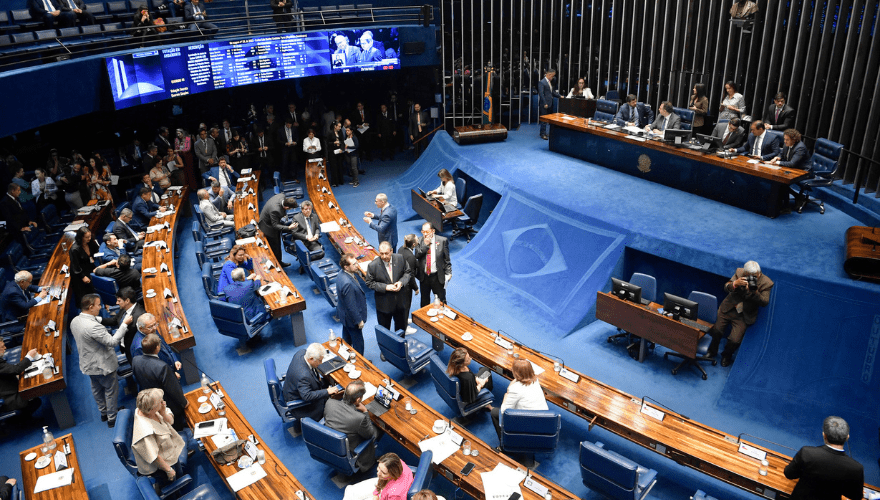PL 334/23
The Senate plenary approved the bill that extends the payroll tax exemption for another four years. This measure, which represents a tax incentive aimed at 17 important sectors of the Brazilian economy with a high employability rate, now goes to the Presidency of the Republic for evaluation. PL 334/2023 now goes to sanction or veto by the Presidency of the Republic.
The author of the project is senator Efraim Filho. The payroll tax exemption was implemented as a temporary measure in 2012, having been extended since then. The current exemption is valid until December 31, 2023, that is, the approved project determines the extension from January 1, 2024 until December 31, 2027.
"Companies need legal security to be able to have time to open new branches, expand their business and, therefore, hire more people, which is the purpose of this public policy, to remove fathers, mothers and young people from the unemployment line and, with sweat of your face, put bread on the table in your house."
The matter, reported by senator Angelo Coronel, relieves payroll by allowing the company to replace the payment of 20% tax on its payroll with rates of 1% to 4.5% on gross revenue.
"These are the sectors that employ the most in Brazil, and maintaining tax relief is extremely important to maintain jobs," said the rapporteur.
Senator Carlos Viana defended the approval, as he understands that increasing the tax burden on productive sectors chokes the market and harms the economy.
Project approved by the Plenary goes to sanction; In addition to companies, small municipalities will be exempt from taxes. (Image: Jonas Pereira/Agência Senado)
The president of the Senate, Rodrigo Pacheco, stated that the extension of the exemption "is a boost for sectors with high employability and which obviously need to be recognized".
To compensate for the decrease in government revenue, the approved project also extends the 1% increase in the Cofins-Importation rate until December 2027.
The Executive Branch will have to define mechanisms for monitoring and evaluating the impact of payroll tax relief on the maintenance of jobs in companies, the text provides.
Efraim Filho argues, in justifying the project, that it is necessary to maintain tax relief in the face of a scenario of inflation and high interest rates and the uncertainties of the world economy. According to him, the measure "is in line with the constitutional principle of seeking full employment." The senator also states that the exemption does not result in less social investment.
"The idea is that this mechanism will enable the opening of more jobs. In relation to the financial and budgetary impact, we understand that the incentives provided for in the project have already existed for years and do not constitute a relevant innovation in the legal system", states Angelo Coronel in his report.
During the vote in the Plenary, he accepted and the senators approved an article included in the Chamber of Deputies that provides for a reduction in the rate from 2% to 1%, until December 2027, for collective road passenger transport companies, with fixed itineraries, municipal, intermunicipal in metropolitan region, intercity, interstate and international. All other changes by the Chamber were rejected.
Small municipalities
The approved text determines the reduction, from 20% to 8%, of the social security contribution rate on the payroll of municipalities with a population of up to 142,632 inhabitants.
"It is a matter of justice to reduce the rate from 20% to 8%. It is worthwhile, everything happens in the municipalities, we cannot sacrifice these Brazilian municipalities that have a population below 142 thousand inhabitants. Those with a population above 142 thousand inhabitants already there is an increase in the Participation Fund", said Angelo Coronel.
The measure will benefit more than 3 thousand municipalities and around 40% of the Brazilian population, according to him.
"Although the measure has a relevant impact on the services provided by city halls, reinforces the funds of federated entities and enables a better life for people in the most needy regions, there is no fiscal impact on the public sector, as it is an improvement of the pact federative - the Union stops collecting contributions from municipalities, having a neutral net effect on the public sector. In numbers, the federal government would stop collecting R$9 billion annually, amounts reduced compared to the benefits to other federated entities."
According to him, the benefit to these municipalities is justified because the legislation equates them to companies for the purpose of collecting social security contributions.
.

 Mr. Alessandro Jacob speaking about Brazilian Law on "International Bar Association" conference
Mr. Alessandro Jacob speaking about Brazilian Law on "International Bar Association" conference